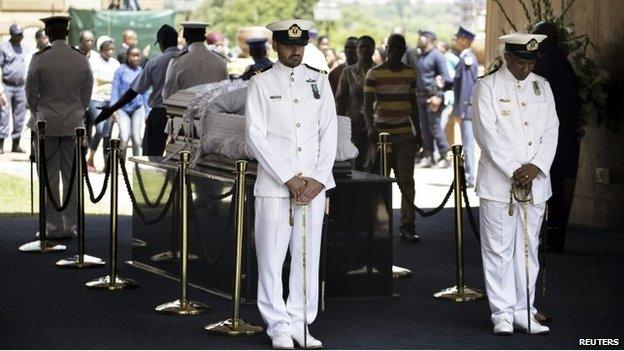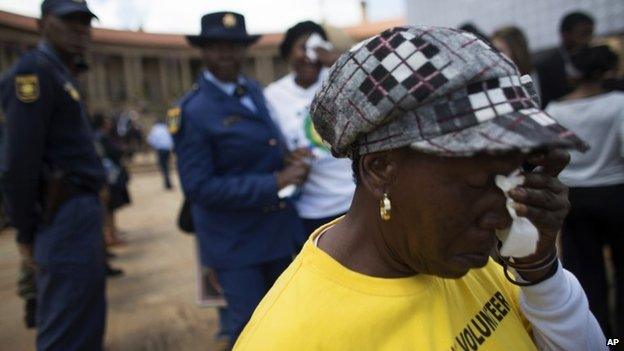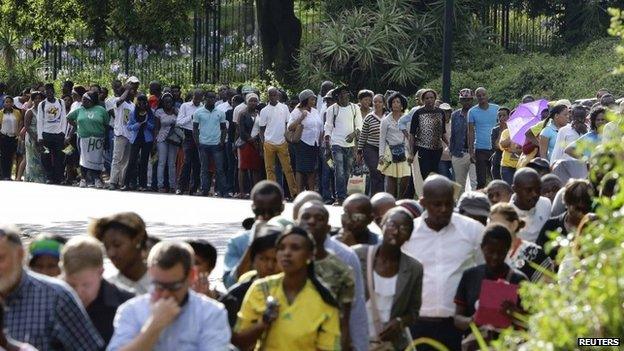'I saw my Mandela... and all I could do was cry'
- Published

Hundreds of people walked past me as I made my way to where Nelson Mandela lay in a wood and glass coffin - all I could hear was the sound of my heart beating hard against my chest.
There were two queues - one on either side of the coffin. Four men dressed in white uniform stood guard around it.
In front of them a petite policewoman directed the flow of traffic: "One to my left, one to my right, please," she said as I approached.
She was no more than a metre from me but her voice sounded distant - drowned out by the sound of my beating heart, now louder and faster.
The path to the coffin was lined with a red carpet. I saw the casket before I reached it.
There it was, the box that would imprison Mandela for all eternity.
As I got closer, my knees felt weak and heavy. It was as though I had forgotten how to walk. "Left, right, left right," I said in my head - an instruction I had never before needed to give myself.
My heart was now beating even faster and louder.
I don't know why I was so anxious.
I have been to many funerals in my life and filing past an open coffin is standard practice at funerals for black South Africans.
But of all the funerals I've been to, I have only cried twice after seeing a loved one.
The first was at my beloved grandmother's funeral in 2002, the second was at the burial of my cousin, who I had always regarded as an older sister.
And now for Mandela, a man I had no worldly relation to but deeply loved.

Seeing Nelson Mandela's body has made his death a reality for many South Africans
I loved him more than I realised until I saw him lying there, lifeless.
Overwhelming grief
Something about Mandela made you feel like he was exclusively yours, whether you had personally met him or had merely been in the same space as him.
He could be in a room of thousands of people, look in your direction and make you feel as though you were the only one who mattered to him.
That is a rare and special gift.
My time with him in that temporary wooden arch was exactly like that.
There must have been eight people inside, four on either side but it felt like I was alone - my moment to say goodbye to my Mandela.
They all raised their fists in the freedom salute and walked out. I felt a lump in my throat.
There lay the man the world knew as a fighter, except this time he wasn't fighting: he didn't need to any more - he was at peace.
I raised my hand to wave goodbye; it felt heavy. "Up," I said in my head, trying to command my now defiant hand.
And muttered a salute "Ah Dalibhunga" - the name he was given as chief.
It is a sign of deep respect in the Xhosa culture, which Mandela and I share.
My "Mandela moment" was no longer than two minutes but for me felt like an eternity.
As I shuffled out of the arch, police standing on either side, I felt my shoulders shaking and tears burning behind my eyes.
And that's when it happened - that is when it felt real.

Queues wound down the road for the chance to say a personal goodbye to Nelson Mandela
Madiba was gone.
There was none of the singing we had seen in the past few days, just people crying and holding each other - many of them strangers.
I don't know where she came from, the woman who offered me a tissue and held me.
She was a soldier - that was the first time I'd ever been held by a soldier.
I had to sit down for a bit at the bottom of the stairs and just watch the people walking past, studying their faces.
But most importantly, I had to have a good cry.
I don't remember the last time my heart ached this much - perhaps at my granny's funeral. I'm not sure.
I've written countless articles about Mandela and used the phrase "Father of the nation" quite liberally.
But today - today I understood what that truly felt like and it filled my heart with overwhelming grief.
Still here
Sitting down at the bottom of those large brown stairs looking at the Union Buildings, the South African flag flying at half-mast, I began processing.
I saw him, I saw my Mandela. The man who had made it possible for a girl like me to be where I am. I saw him and all I could do was cry.
There he was, the man who made me believe that nothing was out of reach - that people of my skin colour were not inferior, regardless of what some in the country believed.
Dressed in a yellow African print shirt, his coffin lined with white flowers, he lay there in mortality but still a giant.
He didn't look like a man who had battled terrible sickness and that was important for me.
No-one wants to remember a loved one looking frail.
I watched families and strangers embrace, I now in the arms of Helene, a white colleague who I had only met yesterday, both of us feeling utterly broken.
It hit me - this is what he and many others who had passed before him had spent so many years in prison for.
It was so a black girl from an unknown village could cry in the arms of a white girl from a faraway land, knowing that we felt the same pain - that for me was profound.
I stood up, took one more look at the arch and walked away, thinking: "Madiba, you are still here."
Ah Dalibhunga!